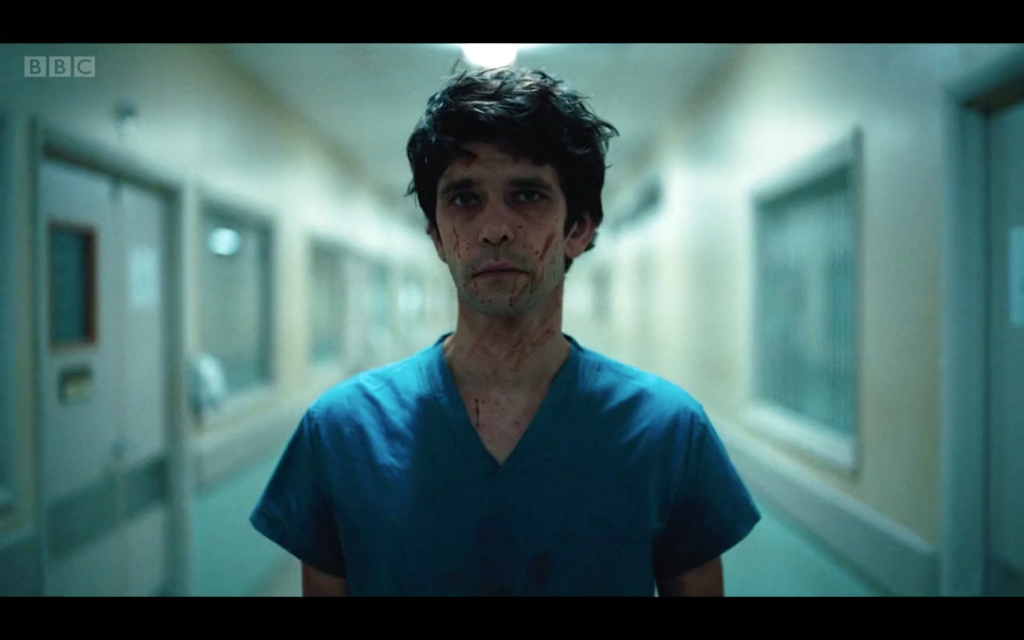
PHOTO COURTESY OF BBC AND AMC, Caption: Whishaw’s multi-layered performance of junior doctor Adam Kay is what gives the cynical character his humanity and empathy. While Kay toes the line between barely likeable and downright unlikeable, his prickly nature is a shield against the chaos and trauma of his profession.
“This Is Going to Hurt” reveals the injuries of the medical system
Though labeled after a drama-comedy, This Is Going to Hurt is the cookiecutter of tragi-comedy. At first, there is not much that is appealing about the show–its synopsis is nothing special. However, as the pilot episode reaches its climax, This Is Going to Hurt proves itself that indeed, it deserves more popularity.
Titled after Adam Kay’s memoir of the same name, This Is Going to Hurt is a dramatization of Kay’s life as a junior doctor in the NHS. Adam Kay–played by British actor Ben Whishaw–is the cynical, sarcastic, and exhausted protagonist. In the first episode, Kay fails to diagnose severe preeclampsia in a supposedly “crying-wolf” patient and attempts a difficult surgery on her, nearly resulting in her death. A complaint is filed, and begins show’s conflict.
This Is Going to Hurt is witty as it is hilarious and tear-jerking; the best thing about it is how it paints a painfully raw story of how a broken medical system forces normal medical workers to attempt superhuman feats. It does a terrific job at showcasing the exhaustion of medical workers, domestic abuse victims, high (and ignored) suicide rate of health workers, idyllic lies about the life of a doctor to family, and the trauma it can cause.
The acting is phenomenal, and the other half of what makes This Is Going to Hurt remarkable. Whishaw’s performance of the heavily flawed Adam Kay is what gives the empathy and charisma to his character. Whishaw showcases his vulnerability – loneliness – in the undercurrent of his performance, hiding it with charismatic dark wit and humor. This idea is exemplified with every episode as Kay’s flaws and mistakes take a toll on him and his eyes get warier with a bloodshot desperation.
Ambitka Mod, actress of trainee doctor Shruti Acharya, should also be noted for her acting. Mod flawlessly shows the effects of an incessant depression as Acharya realizes the system she works for is not worth it. Acharya has less and less individuality every episode, bringing the notion that she is losing her sense of self as she is unable to adapt to the unrelenting system that has altered her worldview.
However, all media has its faults – This Is Going to Hurt is no exception. Despite its compelling message, a large part of its meaning can be lost. Kay, compared to his book counterpart, is much more unlikeable in the show because the author decided to intensify his own flaws. Whishaw’s Kay is an unconventional protagonist — he is either liked or disliked. Protagonists are supposed to be interesting and somewhat likeable; when they are not, the meaning they bring to the story is lost.
In the end, This Is Going to Hurt is a love letter to medical workers. It acknowledges the challenges given to all medical workers — how they are humans expected to perform Herculean feats — all while managing to shift from hilarious to melancholic in a matter of minutes. It makes the statement that health workers do not put up with 90-hour work weeks, understaffed workplace, relationship strains, and high pressure for the money; they do it because they care. Yet their compassion is ignored and swept away by elites and media all while the system that failed them still stands.